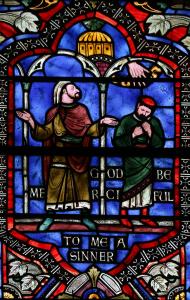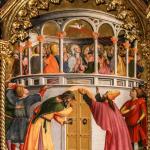
There are two common errors which religious people often fall into. The first is the way many of them become triumphalistic with their faith; they end up think their faith, and their way of engaging their faith, is better than anyone and everyone else’s leading them to look down upon, if not be abusive towards, those who believe or act differently to them. The second error comes from an inversion of this; instead of being prideful and triumpalistic, such believers end up looking down upon themselves, thinking they fail to live up to their faith, and so fall into the pit of despair, fearing that they will never be good enough. Jesus would have us avoid both of these common mistakes. He came, in part, to tell us the good news, the news that God is loving and is willing to help anyone with that love.
Pride can lead someone to believe that their own spiritual practices or acts of piety should be something everyone follows and does, leading them to unjustly judge everyone who is not like them. On the other hand, it often will lead them to unjustly favor and promote those who are similar to them, determining them to be faithful and worthy of respect. Most of what is used to make such judgments are external appearances, which of course, mean such judgments are superficial. Pride, however, encourages this superficiality, for then it allows the prideful person to use the same superficial standards to promote themselves, indeed, to make themselves think they are perfect and should be rewarded by God for their perfection (instead of realizing their need for God and God’s bountiful, gracious love).
Those who are in the midst of despair fear that God will always cast them aside and ignore them, and so, feeling as if they have no hope, will not look for or open themselves to receive God’s grace. This means, though they have a different reason for it, they, like the prideful person, cause their own problems, as they do not allow grace its proper due.
Of the two, the prideful, self-righteous, religious person is far worse, for the one who is in the midst of despair recognize the need they have for God in their lives. This will explain why Jesus more often than not will criticize various forms of pride with his parables, while offer consolation and hope to those in the midst of despair. And so, as way to counter those who are so full of themselves due to their religious observance, Jesus gave us the parable of the Publican and the Pharisee:
Two men went up into the temple to pray, one a Pharisee and the other a tax collector. The Pharisee stood and prayed thus with himself, `God, I thank thee that I am not like other men, extortioners, unjust, adulterers, or even like this tax collector. I fast twice a week, I give tithes of all that I get.’ But the tax collector, standing far off, would not even lift up his eyes to heaven, but beat his breast, saying, `God, be merciful to me a sinner!” I tell you, this man went down to his house justified rather than the other; for every one who exalts himself will be humbled, but he who humbles himself will be exalted.” (Lk. 18:10-14 RSV).
The publican, the tax collector, might have easily gone into a state of despair, but he didn’t. He went to the temple, and he simply looked up to God, hoping for mercy, mercy which God was willing to give. The publican recognized he needed it, that he, by himself, was a sinner, and that he lived a life that many, like the Pharisee, could and would condemn. But the publican didn’t want that to be the last word, indeed, he didn’t believe it was, which is why he went to the temple, so that God could and would help him change for the better.
The Pharisee, on the other hand, might have, superficially, and externally, seemed to have done everything right, but he did everything for all the wrong reasons, with the wrong attitude, and so, in a way which was also sinful. Sadly, the Pharisee did not understand this; he did not see the way he sinned. He thought he was perfect and better than everyone else. He was thankful, not because of God’s gracious love, but because he believed that God made him to be superior to others. He didn’t honor or respect God; instead, he seemed to treat God as a thing to control and manipulate by his religious observance. This can be seen reflected in the way he dishonored God by judging and condemning those God loved. He could thank God all he wanted, but that thanks, like his worship, was perverted, representing another way by which he dishonored God all the while doing things which would make him look like he was honoring and respecting God.
Those who judge themselves to be so perfect that they can and will dishonor everyone who is not like them are far from the perfection they are meant to have. The lowly tax collector, living an otherwise sinful way of life, was closer to perfection than the Pharisee because he didn’t judge or condemn others. Also, unlike the Pharisee, the publican knew he needed God’s help and so could and would open himself up to have a proper relationship with God, the kind necessary for one to truly become perfect.
In the parable Jesus, we are shown how many who are appear to be righteous, spiritual people will prove to be “evil men and impostors” (cf. 2 Tim. 3:13 RSV); because they do not embrace God’s ways, they “will go on from bad to worse, deceivers and deceived” (ibid). They misunderstand spirituality and what religion is meant to be about even as they take on the mantle of religion so as to represent it to the world. This is not to say all who appear faithful and just in the world are not; there are many who prove themselves to be true followers of Christ, not only by the kind of words they speak, but by the kindness and charity they engage throughout their life (without looking for anything in return). Thus, Jesus was not speaking out against all who are religious, nor all who appear religious, and so, he was not speaking out against all Pharisees; rather, he was giving out a warning, telling us not to assume that those who appear religious are righteous, even as he was reminding us that many who otherwise seem sinful and far away from God, prove to be closer to God than those who appear religious. We should not judge and condemn others for being different from us, for getting things wrong – rather, we should look to ourselves, realize our own needs, and accept that God, with love and grace, will provide what we need so long we do not cut ourselves off from God with a bad attitude. Then, we will be like the publican who, understanding his failings, avoided the pitfall of pride, even as knowing the loving mercy of God, he did not fall into the pit of despair.
Stay in touch! Like A Little Bit of Nothing on Facebook.
If you liked what you read, please consider sharing it with your friends and family!
N.B.: While I read comments to moderate them, I rarely respond to them. If I don’t respond to your comment directly, don’t assume I am unthankful for it. I appreciate it. But I want readers to feel free to ask questions, and hopefully, dialogue with each other. I have shared what I wanted to say, though some responses will get a brief reply by me, or, if I find it interesting and something I can engage fully, as the foundation for another post. I have had many posts inspired or improved upon thanks to my readers.













